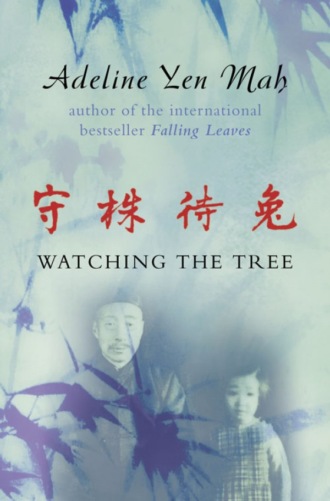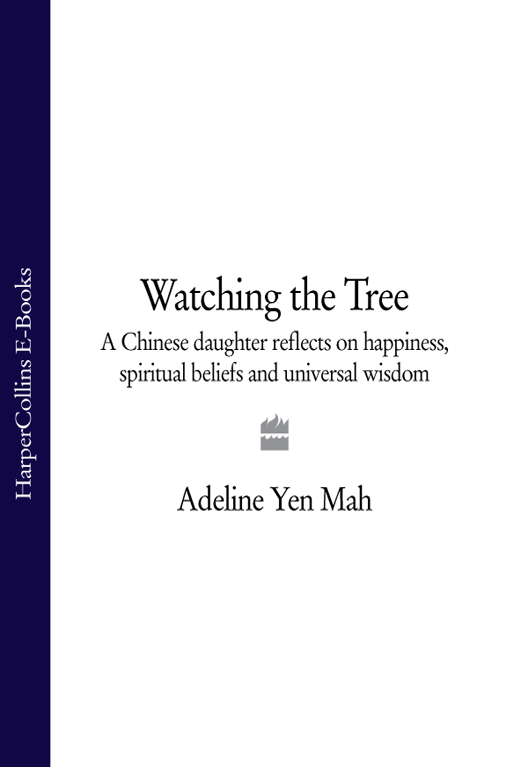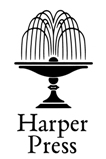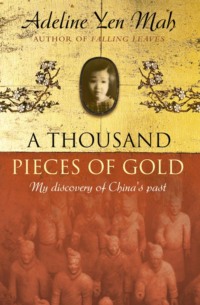
Полная версия
Watching the Tree: A Chinese Daughter Reflects on Happiness, Spiritual Beliefs and Universal Wisdom


Watching the Tree to Catch a Hare

A Chinese daughter reflects on happiness,
spiritual beliefs and universal wisdom
ADELINE YEN MAH

DEDICATED TO
MY GRANDFATHER
YEN QIAN LI

(1878–1952)
I wish to thank my Ye Ye and honour him in
Watching the Tree. His memory continues to give me strength. I hope his teaching will be of help to some who are also searching for spiritual tranquillity and solace.
To my husband and best friend, Bob,
without whom this book could not have been written.
To our mentor Mason Wang,
for his help in the Chinese classics.
To our daughter Ann Mah,
for her encouragement.
To Zhang Qing-Ying,
for her beautiful calligraphy.
CONTENTS
Cover
Title Page
1. Watching the Tree to Catch a Hare

2. Light at the End of the Tunnel

3. Hidden and Nameless Tao

4. Do Not Do to Others What You Do Not Wish Others to Do To You

5. Look Inwards for Salvation

6. Thousands and Tens of Thousands of Varieties of Qi

7. Let Food be Medicine

8. Know the Opposite Party as Well as You Know Yourself

9. Hidden Logic Within the Shape of Words

10. The Sight Strikes a Chord in my Heart

11. Frog at the Bottom of a Well

12. The Lessons of Silence

Author’s note
Index
Also by Adeline Yen Mah
Copyright
About the Publisher
1 Watching the Tree to Catch a Hare

My grandfather (Ye Ye) and I shared a rapport that neither of us ever verbalised during his lifetime. He was a businessman but was more interested in books than money. As a little girl in Shanghai, I spent hours playing by myself on the balcony attached to his room. Through the French windows I could see him practising calligraphy, writing letters or consulting the I Ching. Sometimes, he would let me ‘help’ him make fresh ink by grinding the ink-stick on an antique stone slab left to him by his father. I did not inherit Ye Ye’s artistic talent and was in awe of his shu fa

As the youngest stepdaughter in a Chinese family of seven children, I knew I was unwanted and considered by my family to be the lowest of the low. At home, my misery filled my whole world. It was real and deep and I could see no way out, possessing neither the wisdom nor the cynicism to blunt the cruelty and the constant rejection.
When I was ten, my stepmother Niang separated me from my aunt, whom I dearly loved, and placed me in a succession of Catholic boarding schools. I was unaware that all my mail (both incoming and outgoing) was being sent to my parents for censoring. I only knew that I never heard from my aunt or anyone else for the next four years.
During that time I had nobody but my grandfather. Although I was only allowed ‘home’ on three separate occasions, I treasured those brief visits. I did not know then how vital they were to my emotional and spiritual development.
The Swedish psychologist Eric Ericson wrote of a sense of basic trust, which is instilled in a child by ‘somebody who cares’, without which the child cannot live and dies mentally. This ‘basic trust’ was what my Ye Ye gave to me at that crucial juncture. During the many years when I was isolated in the boarding school in Hong Kong, I was sustained only by my inner conviction that my Ye Ye loved me. At times, things were very bad. My stepmother had a way of making me feel like nothing; a piece of garbage to be thrown away. But, through it all, the thought of my Ye Ye would return and revive my spirits at odd moments. Deep inside, I knew I mattered to him and that he believed in me.
Many decades passed before I came to recognise the depth of his influence. His thoughts were pivotal in shaping me into the person I became. This book is a letter of gratitude to a grandfather who once gave me the most precious of all gifts: my sense of hope.
At the dawn of our new millennium there is a hunger in people throughout the world to comprehend who we are and how we fit together. As a result, interest in eastern philosophy is growing in the west. One quarter of the world’s population lives in China, eats with chopsticks and speaks Chinese. As products of the oldest living civilisation whose culture and language have survived virtually intact, Chinese philosophy, beliefs and wisdom have much to offer. Watching the Tree is concerned with Chinese thought and the reason why we Chinese think the way we do. In it, I have used many incidents from my life to illustrate certain Chinese concepts and related what I have learnt from them.
In my first book, Falling Leaves, I reported my Aunt Baba’s words when we were reunited after a separation of thirty years.
‘The way I see it [she said], the nineteenth century was a British century. The twentieth century is an American century. I predict that the twenty-first century will be a Chinese century. The pendulum of history will swing from the yin ashes brought by the Cultural Revolution to the yang phoenix arising from its wreckage.’
Having lived and worked as a physician in California for thirty years, I consider myself Chinese-American and am very fond of my adopted country. My aunt, however, was born in 1905 and still saw the world through lenses moulded by China’s humiliations during the two preceding centuries. From the dawn of history, we Chinese had regarded China as the centre of the world, and considered every other nation to be barbaric. In 1842 China lost the Opium War and Hong Kong was ceded to Britain. Subsequently China endured 150 years of foreign exploitation and coastal cities such as Shanghai and Tianjin came under foreign control. My grandparents, parents and aunt were all born in the French Concession of Shanghai, where they were ruled by Frenchmen under French law and lived as second-class citizens in their own native city. Perhaps as a consequence, my grandfather, aunt and father used to view all westerners with a mixture of awe and resentment.
After Sun Yat-sen toppled the imperial Qing dynasty in 1911, China became a republic. The country soon broke up into fiefdoms ruled by warlords, who fought the Japanese as well as each other for control. Chiang Kai-shek, a military general and protege of Sun Yat-sen, united the country after Sun’s death but was forced to escape to Taiwan when he lost the civil war to the Communists under Mao Zedong in 1949. Mao drove out the foreigners along with the Nationalists, proclaimed the founding of the People’s Republic and, on 1 October 1949, declared from the Gate of Heavenly Peace in Beijing that ‘the Chinese people have finally stood up for themselves’, meaning that China was no longer subject to foreign rule.
From 1949 until his death in 1976 Mao was essentially China’s one-man dictator. My aunt compared him to Qin Shi Huang Di, the ‘terracotta army’ emperor who united China in 221 BC and whose power and cruelty were legendary. Under Mao’s reign, love of the motherland was the highest virtue on earth. In its name rested sanctity, salvation and a purpose of life. Nationalism replaced Confucianism, Taoism and Buddhism as the Chinese people worshipped at the altar of Mao. China remained isolated, backward and undeveloped for the twenty-seven years under Mao’s rule. The Cultural Revolution (1966–72) was unleashed by Mao to topple his enemies and to free the country of the ‘four olds’ – habits, customs, ideals and creeds. Instead, it wiped out all traditional codes of beliefs and produced a bewildered generation of Red Guards. Even today, there are those within China who preach xenophobia, isolationism, protectionism and resistance to modern market policy. A case of Maoism versus the Disney-fication of China.
Following the break-up of the Soviet Union, the USA is the only superpower left on the world arena today. The dominance of America stems primarily from a philosophy of private enterprise that underpins its economic, educational and political systems. Although China is the world’s most populous country, with 1.3 billion people, it is only one of many ascending nations jockeying for position. Asian countries such as Japan, Korea, Malaysia, India and Pakistan have all undergone industrialisation and modernisation within the last fifty years. Our whole world is already a fusion of east and west; around the globe we are becoming ever more closely linked by ties of environment, security, trade and information. It is now vital for all our futures that we gain an understanding of each other’s history, language and culture.
When I was thirteen years old, my stepmother informed me that I was to leave my school in Hong Kong the following year and get a job because my father could no longer afford my school fees. Desperate to get further education, I confided to my grandfather Ye Ye that I was considering running away secretly to join my Aunt Baba back in Shanghai. Would he consider lending me the fare?
‘What will you do in Shanghai?’ he asked.
‘Go back to my old school. I can’t wait to see all my old classmates again. When my parents took me away from my Shanghai school three years ago, I had just been elected class president. Do you think they will still let me be class president when I go back?’
Grandfather looked at me with a peculiar expression. ‘So you think everything in Shanghai will be exactly the same as when you left? How childish you are! Have you forgotten again what it says over and over in the I Ching? The only thing that does not change is that everything changes.
‘Let me tell you a story that I hope you’ll never forget. Once there was a boy who was told by his master to catch a hare. He went into the woods and looked around. Lo and behold, at that very moment, he saw a hare running along at full speed. As he watched in astonishment, the hare ran smack into a tree and knocked itself unconscious. All he had to do was to pick it up. For the rest of his life the boy waited behind the same tree in the hope that more hares would do the same thing.
‘That boy is like you, expecting the same conditions to be waiting when you return to your school in Shanghai. Watching the tree to catch a hare (

That was one of the last conversations I had with my grandfather. He died a few months later.
Did my grandfather make up this story? No. Who wrote it? A philosopher named Han Fei Tzu

After the publication of Falling Leaves many readers wrote to ask me: ‘Given the fact that China was so much more advanced than other civilisations up to the time of Marco Polo (Yuan dynasty – 1260–1368), why did it fall behind the west from then on?’
There are many theories put forward to explain China’s decline. Mine is very simple and is based on one word: education. In the chapter on Confucius I discuss how, for over 2000 years, the sole purpose of education in China was to study the works of Confucius so as to pass the imperial civil examinations and become a magistrate. The study of astronomy (tian wen

During the nineteenth century, the Industrial Revolution freed man from the drudgery of manual labor, but the information revolution taking place now will cause far more radical revisions, because it is unleashing the power and expanding the dimension of man’s minds.
In terms of material wealth and scientific progress, achievements in the west have been undisputedly awesome in the last two hundred years. But, has western prosperity brought westerners inner contentment and genuine satisfaction? When desire for money takes precedence over human relationships, can one be truly happy?
Throughout the world people are yearning for spiritual inspiration as well as for a purpose to their lives. Nowhere is this search more urgent than in China where, since the death of Mao, people have become increasingly desperate to find religious meaning and substance. The success of cults such as Falun Gong reflects this hunger. Many are seeking alternatives to materialism, science, Communism and the institutional religions.
When I was eleven years old my parents placed me in a Catholic convent in Hong Kong as a boarder. Soon I came under the influence of Catholic nuns and was quoting the Bible. During one of my rare visits home I discussed my newfound faith with my grandfather (Ye Ye) and he compared our respective beliefs.
‘As a Chinese from the old school, I have always had difficulty sticking to any one religion,’ Ye Ye said. ‘Even though I believe in reincarnation because I am a Buddhist, I honour my ancestors and read the I Ching and the Tao Te Ching

‘Unlike Muhammadans or Christians, we Chinese have trouble with the western view that there is only one true God. Why can’t Muhammad be accepted as a prophet as well as Moses? Why does one belief have to exclude another? Why can’t all the religions merge together and become one?
‘As a boy, your father got into big trouble with an American firm once because he wrote on his job application form next to “Religion?”: “Catholic, but willing to become Methodist as well, if necessary.” The manager summoned him into his office and called him a “rice Christian”, ready to turn his back on Catholicism for a job with a Protestant firm.
‘ “Why must there be only one true sect?” your father protested. “Why can’t I be a Catholic as well as a Methodist? Why can’t I be both?”
‘But the American manager was angry and your father didn’t get the job. So he moved to Tianjin and worked for me instead.’
In the following chapters I shall outline the differences between east and west on a number of fundamental topics. Because some Chinese words are non-existent in English, just as various English words are absent in Chinese, the only way in which to grasp certain concepts that are unique to China is by leaping across national barriers and allowing for the possibility that truth may be reached in a language other than one’s own.
One Chinese book which will open realms of thought beyond the usual western parameters of perception is the I Ching. Other ideas that play dominant roles in Chinese thinking are Confucianism, Taoism and Zen Buddhism. I illustrate traditional concepts such as qi, feng shui and yin/yang with incidents from my personal life. In each case I hope to bridge the cultural divide between east and west, so that westerners will be able to understand the Chinese way of thinking, discover its roots and see how they resemble or differ from their own. Having spent my first fourteen years in China, and the rest of my life in England and America, I can understand the mind set of both world views.
When my father sent me to study in England in the 1950s, there were few Chinese students in Europe or America. Nowadays, more and more are migrating to the west in search of education, freedom, prosperity and happiness. Deregulation of telecommunications, growth of international trade, ease of air travel and the Internet will ensure increasing contact between east and west. Many childless would-be parents from America are adopting unwanted Chinese baby girls. Intermarriage is also on the rise. My own son married a Brazilian woman whose parents came from Austria and they have an adorable baby boy. The destiny of such infants will write a new chapter in the future relationship between China and the west.
What will that destiny be? The proverb shou zhu dai tu

Religion and spirituality are ambiguous words with widely differing interpretations. Watching the Tree attempts to deal with these terms on a scientific and rational basis, without dogma or superstition. The great German philosopher Martin Heidegger once wrote, ‘Whatever and however we may try to think, we think within the sphere of tradition.’ But what if I were to introduce to western readers a new and entirely different tradition? Could their thoughts become transformed and undergo fresh and radical change?
Philosophy starts with wonder and knowledge is power. Aristotle said, ‘All men by nature desire to know.’ Indeed, Chinese and Westerners alike are all searching for rational and intelligent answers. Somewhere it is written that every Chinese wears a Confucian thinking-cap, Taoist robe and Buddhist sandals. Like my two previous books, Watching the Tree is autobiographical and gives you a glimpse into a Chinese mind. You can see the basis of my personal philosophy and the reason why I think the way I do. I hope it will provide you with an introduction to eastern thought, one that you can use as a stepping stone on your individual path towards the development of your own beliefs.
Enjoy! I wish you happiness.
Конец ознакомительного фрагмента.
Текст предоставлен ООО «ЛитРес».
Прочитайте эту книгу целиком, купив полную легальную версию на ЛитРес.
Безопасно оплатить книгу можно банковской картой Visa, MasterCard, Maestro, со счета мобильного телефона, с платежного терминала, в салоне МТС или Связной, через PayPal, WebMoney, Яндекс.Деньги, QIWI Кошелек, бонусными картами или другим удобным Вам способом.



